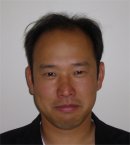|
Plenary Lecture
Effects of Exercise on Reaction Time to
Peripheral Visual Stimuli

Dr. Soichi Ando
Post Doctoral Fellow
School of Nursing
Kyoto Prefectural University of Medicine
Japan
E-mail:
sando@cmt.kpu-m.ac.jp
Abstract:
Vision is one of the most important sensory
modalities in humans. Visual reaction time (RT) is the
time from the appearance of a visual stimulus to the
onset of motor output, and it has been used to assess
perceptual and cognitive abilities in athletes. Visual
field is composed of central and peripheral components.
The ability to respond to peripheral visual stimuli as
quickly as possible may be relevant to ball sports in
which capturing visual information from the periphery of
the visual field plays a role in performance. The
purpose of this study was to examine effects of acute
exercise under normoxia, hypoxia, and hyperoxia on the
ability to respond to peripheral visual stimuli. Results
showed that: (1) under normoxia, premotor component of
RT (Premotor time) to peripheral visual stimuli was
vulnerable to exercise as compared with that to central
visual stimuli; (2) under normoxia, RT to peripheral
visual stimuli increased during exercise at high
workloads above the ventilatory threshold (VT) relative
to that at rest, while the RT was not affected by
exercise at the VT and below the VT; (3) under hypoxia,
Premotor time to peripheral visual stimuli increased
during exercise at low, moderate, and high workloads,
and the increase in Premotor time was accompanied with
decrease in cerebral oxygenation; and (4) under
hyperoxia, Premotor time to peripheral visual stimuli
was not different between at rest and during exercise at
high workloads. These findings suggest that exercise at
high workloads has detrimental effects on the ability to
respond to peripheral visual stimuli unless oxygen
availability was increased. Cerebral oxygenation may
play a key role in visual perceptual performance during
exercise.
Brief Biography of the Speaker: I received my MSc
and Ph.D. degrees from Kyoto University, Kyoto, Japan in
2001 and 2004. I am currently a postdoctoral research
fellow in Kyoto Prefectural University of Medicine. I
have been working in the area related to human motor
control and sports science. My current research
interests focus on how exercise influences perceptual
and cognitive performance.
|